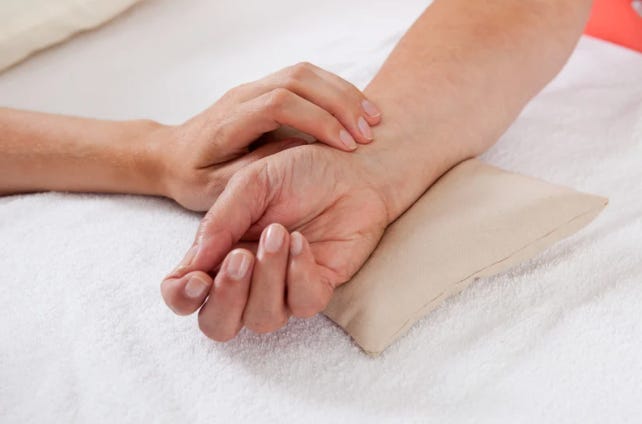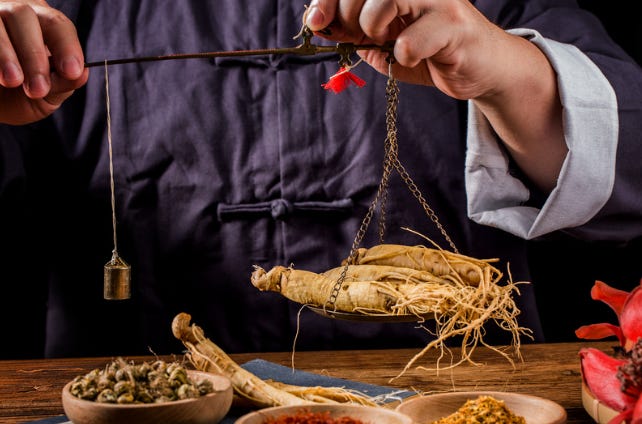What “holistic” ACTUALLY means
I grew up in the United States where western medicine is the predominant medical system (some might think the only). Growing up here I learned that there is a 1-to-1 relationship between medicinals and the symptoms they treat (e.g. ibuprofen for headaches, valerian root for sleep, benzos for anxiety, etc.). This is the definition of conventional (or allopathic) medicine.
It seems that most people think that using herbs is enough to constitute as holistic medicine just because herbs are more natural than pharmaceuticals. This is incorrect. If you use chamomile because it “helps sleep” and ginger because it “aids digestion” then you’re not practicing holistic medicine, you’re practicing conventional medicine.

Upon becoming a health practitioner, many people will ask for very general advice on a symptom they have (e.g. “I’m having trouble sleeping, what can you prescribe?” or “My son has a rash on his forearms, what do you think it is?”). When this happens to me (and it happens a LOT), I explain that the medicine I practice is holistic, so I don’t diagnose or prescribe herbs based on one symptom. If someone wants advice from the lens of Chinese medicine, it’s my responsibility to do a full intake to get the whole picture before dispensing any advice (or herbs).
Let’s talk about what it truly means for something to be “holistic.”
This may be a good time to point out that if your friend or someone you know is a health practitioner, that doesn’t mean it’s okay to casually ask them for medical advice. Book a session or ask if they have the time & space to discuss something with you.

The key is that holistic medicine takes into account that symptoms do not occur in a vacuum, but are part of a larger picture. Western medicine tends to see bodies as machines, making the doctor akin to a mechanic. Gallbladder issues? Cut it out.
In Unbroken Field, Dr. Michael Greenwood says that taking Tylenol in order to erase symptoms (e.g. a headache) is like going to the mechanic because your “check engine” light is on, and the mechanic cuts the wire of your warning light so it no longer flashes. “You came in because your check engine light was flashing… it’s no longer flashing. That’ll be $280.”
Conventional medicine by definition is aimed at relieving (or sometimes hiding) symptoms. This means that in general, it’s a band-aid. Holistic medicine on the other hand strives to resolve the root of these symptoms so that the conditions no longer arise for the symptoms to come back.
A Chinese medicine formulation will directly & quickly address the symptoms (e.g. relieve a stomach ache) and then the rest of the ingredients in the formula (or a modified formula) will address the root (e.g. relative cold in the middle). It’s as if an environment that will continue to cause stomach pain (e.g. cold will always cause pain) is rehabilitated into a more harmonious environment which no longer creates cold (and therefore pain).
I feel passionate about distinguishing these two methodologies because only one of them will ever even approach the root of the problem.

This is the example I use when people think look at me confused when I say I can’t help them based on only a symptom.
If ten different people came into a Western doctor’s office with insomnia, they would all walk out with the same prescription. If ten different people came into a holistic doctor’s office, there may be up to 10 different prescriptions. One person might have an overactive mind keeping her awake, while another has back pain keeping him up, while another isn’t nourished enough to stay asleep (aka “blood deficient” in Chinese medicine), while another is eating too late at night keeping his body awake to digest. Each of these needs a totally different treatment.
A system is not holistic unless it takes into consideration a person’s:
- mental, emotional, & spiritual experience
- home & work environment
- past experiences
- cultural & societal context
- attitude & beliefs
In a holistic medicine like Chinese medicine, the sports you played as a kid, your environment at work, your evening habits, and your attitude toward life are directly relevant to creating a full picture of your current state of health. Your health complaints are recognized as being inside a context… not a discrete entity with no relationship to your mind & emotions.
Someone might be encouraged to get an endoscopy (a tube down their throat to take pictures of their insides) because of stomach pain, when they are simply eating something they don’t know they’re allergic to, or having coffee withdrawal (true story— a friend of mine had stomach pain for 20 years before she realized this was the culprit). A proper intake would help identify such simple fixes.
Sometimes the “solution” isn’t a quick lifestyle change like that, but more related to the general ecosystem of the person. Stomach pain can be caused be excess heat, or cold, or a blockage of qi (just to name a few). So adding warming herbs to someone who has “cold in the middle” can resolve stomach pain no matter how long it’s been an issue.
An additional side effect (the good kind!) of holistic medicine is that as a patient, you will feel more seen & understood. Most all of us have had some experience of leaving the doctor’s office feeling like nothing is any clearer, and we might as well have been talking to a wall. This type of frustration is on some other level, because it comes paired with a feeling of helplessness about our own well-being.
A few years ago, I had to convince a doctor in urgent care to do a CT scan after he told me to go home and call tomorrow if I was still in pain. Luckily we did the scan, and at 10PM that evening I was being prepped for emergency surgery for appendicitis.
Do not ever get me wrong: Western medicine is necessary for many reasons (not the least of which is the value of lab testing), and as a health practitioner I will always have relationships with Western doctors. I also would probably be dead without it, because emergency surgery is not part of Chinese medicine.
But I think the word “holistic” is thrown around too often. And I also deeply believe that the only way to true health is holistic medicine. We cannot ignore our context and treat symptoms as if they came out of nowhere and have no relationship to the way we think and live.
I have so much more to say, but we’ll leave it at that for now. If you’d like to talk more about it, send me a message
Leave a Reply